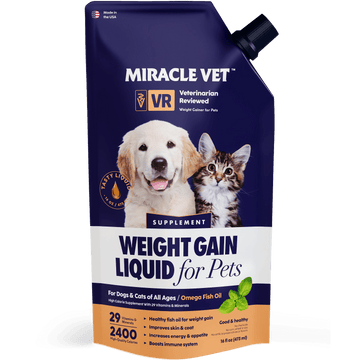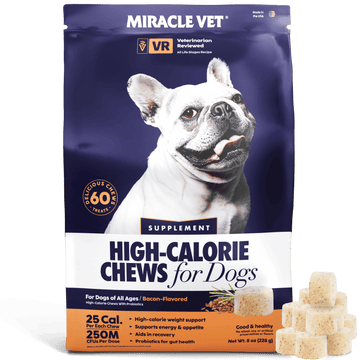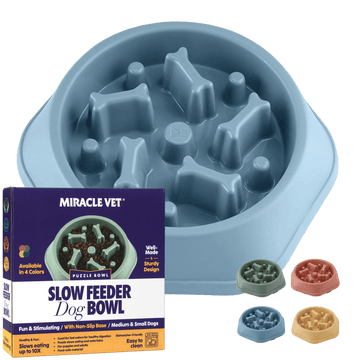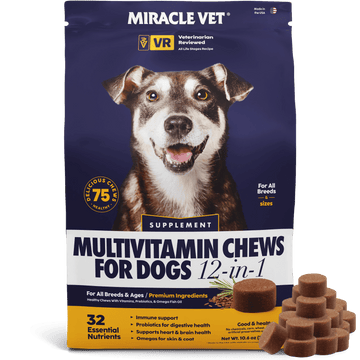
When it comes to weight loss in dogs, there can be many reasons why, and it can be difficult to figure out sometimes.
This article is meant to be a reference or guide when trying to get your dog to gain weight.
We always recommend consulting with a qualified veterinarian first before anything. In an emergency situation such as a dog eating chemicals and vomiting call your vet or poison control center right away.
From illness
If your dog is losing weight, the first thing you should do is take him/her to your vet. There are many underlying conditions that can cause weight loss in dogs, even if they are eating a normal amount.
One of the most common conditions that can cause weight loss is a dog having worms or some kind of parasite.
For example, if your dog has a tapeworm they can eat to their heart’s content and still lose weight. You need to get your dog healthy before proper weight gain can be achieved.
Parvo and Lyme disease are two other common illnesses that can cause weight loss, sometimes accompanied by loss of appetite.
Once you get your dog healthy putting them on a high-quality dog food is better than just giving them a higher quantity of a lower quality food.
Higher quality food will help add weight and is also better for them in other aspects of their health, such as skin and coat, bones and joints, energy level, etc.
Trauma
Weight loss can also be a symptom of trauma. Much like humans, a dog can be traumatized physically, mentally, or both.
If your dog is recovering from an accident such as being hit by a vehicle, or a stumble down a slope while hiking, they can lose weight even after they have been patched up.
One reason for this is lack of energy which leads to lack of activity and loss of appetite. Let’s say your dog has a broken or wounded leg. They will not be running or playing as much.
This can decrease muscle mass and tone. This is a time when you should consider using a supplement.
With a decrease in appetite, a high-calorie additive will help them maintain most of their weight until they are fully recovered.
Dog Depression, also known as an emotional trauma or mental trauma, can be tougher to diagnose. Unfortunately not every dog owner is responsible or knows how to properly correct and train their dog.
This can lead to some people who abuse their dog or even leave them abandoned somewhere. If this happened to your dog, they may have mental trauma.
Nervousness or timidity, fear, aggression, anorexia, and separation anxiety are some of the more common symptoms of emotional trauma.
If your dog is suffering from this you will need to show them a lot of love and affection to make them feel safe and get over their rough past.
You will need to have patience if this is the case. Some dogs and pups can be rebound quickly, others will take time.
Just go slow and make them feel at home as much as possible. Setting up rules and boundaries and establishing yourself as the authority figure will help a sense of normalcy come back into the dog’s life.
Just be patient and continue to work with the dog, they can always bounce back and become a great addition to your family. Once again the quality of food and supplementation is usually the best way to go if this is the case with your dog.
A veterinarian or behavior specialist will help in diagnosing emotional trauma.
New Home Move
Moving to a new home can be traumatic for your dog. This may not seem intuitive, especially if you are bringing a dog home from a shelter but even an improvement in their living conditions can cause stress.
It is not uncommon for a dog to lose their appetite when everything around them is changing.
Dog does not like the food
Another reason your dog may be either losing weight or maintaining a low weight is that they do not like the food you are giving them.
Some dogs are much pickier eaters than others. I have had some dogs that will gobble up anything you put in front of them and others that will turn up their nose at most foods or treats.
It can be frustrating with a picky eater to find what they like. If you are not overfeeding your dog and he/she is leaving food in their bowl, or not eating it at all this might be the reason why.
Of course, this is another time when getting your dog checked out by a vet to ensure there is no underlying issue is important.
There are some brands that will offer a money back guarantee and some that offer free samples, this is one way to save your wallet when trying out new foods.
Also, this can happen if you change your dog’s diet without easing them into their new food.
For the first several days you should serve them a mix of about ¼ new food to ¾ of their old food.
Then ½ and ½ for several days, then ¾ new food to ¼ old food and finally 100% of the new food. If you are constantly changing their food they may stop eating altogether or as much as they should.
Not feeding enough food
Dogs are not robots. There are ways to calculate how much you should be feeding your dog but it is not always the same.
One 55 pound American Pit Bull Terrier may have a higher metabolism than another 55 pound American Pit Bull Terrier thus needing more calories per day.
They key thing to remember is as long as their weight is consistent and healthy you have found the right amount of food per day.
Activity level also plays into this. If you have a dog that is constantly running and playing he/she will need more calories per day to maintain or gain weight than a couch potato.
An underweight dog may need supplementation and a little more food to get up to a healthy weight but the goal is to have your dog’s weight level healthy and consistent.
You do not want to have to put your dog on a weight gaining regimen every couple months when their weight starts to yo-yo. A high-quality food and supplement that keeps the weight on them is better for their long-term health.
Dehydration
A dog can be dehydrated for many reasons. One of the most common diseases is parvo, where it's absolutely imperative to keep your dog hydrated.
Other health issues can be lead to dehydration as well. Diarrhea is a very common condition, many times caused by other health-related issues but can lead to dehydration quickly.
The first symptom you will typically notice is lethargy or lack of energy.
Owners leaving their dogs out on hot summer days without an adequate water supply can also cause issues.
It’s critical to leave your dog a water bowl they can freely drink out of daily. A lot of us in this community like to exercise with our dogs.
A good rule to keep in mind is if you are hot, they are hot. Also, pay attention to their panting.
It is normal for a dog to pant when exercising but if you notice excessive panting and/or continuous panting it is time to stop, take the dog to a cool place and supply them with fresh, cool water.
Diabetes
Diabetes is something your vet will have to diagnose. Unfortunately, there is no home remedy for it.
Your vet will advise you on a diet and exercise regimen. It is important for a dog to keep consistent exercise to help keep their insulin levels steady.
Medications
There can be many reasons your dog might be on medications. When your dogs is taking these it’s best to check the literature that comes with them and talk to your vet.
Make sure also to mention to your vet if any weight loss occurs right after using such medications.
Cancer
Cancer is one of the most devastating illnesses a person or dog can get. One condition often seen with cancer in dogs is called Cancer Cachexia.
This is weight loss associated with the disease. Many of the treatments involved in cancer can cause an upset stomach and vomiting which can contribute to weight loss.
As with any condition you will want to seek the advice of your dog’s vet when deciding on any treatment.
Gum and Tooth Problems
Dental problems can cause pain in your dog’s mouth and make them not want to eat.
You will want to take your dog to their vet and have this checked out as there are several different types of dental problems and figuring out exactly which one your dog has is important.
Some dogs will retain their baby teeth, they could have a crooked or broken tooth or any number of gum diseases such as gingivitis, or an abscess on their gums.
Once this issue is resolved it should be easy for your dog to gain weight again as their appetite will almost immediately improve when they are done with their medication.
Parasites
One common condition that can cause weight loss is parasites. Even if your dog is eating a healthy amount of food parasites will cause weight loss.
In fact, some people have even given themselves a tapeworm or other parasite in an attempt to lose weight.
This is of course very unhealthy and something that should never be done. If your dog has a parasite weight loss is one of the most obvious symptoms.
Because they typically live in the intestinal area of your dog they may cause upset stomach and trouble with defecating. You may notice your dog “scooting” across the floor trying to scratch their butt.
Also, you may see some parasites in their stool. Your vet will be able to diagnose and treat the parasite.
Most vets will also recommend a preventative treatment after they are clear of parasites.
Often a monthly chewable medicine, these can help keep the problem from ever occurring or happening again. It is especially important to get your dog checked for parasites if they are eating and still losing weight.
Older dogs and digestion
While all dogs can have digestive issues it is more common in older dogs. There are many reasons a dog can have indigestion.
It could be anything from a food allergy, a virus, Inflammatory Bowel Disease, to something much more serious like a tumor or polyp.
Obviously, your vet will be the best way to tell if it is a serious medical condition or virus. If you suspect an allergy it is important to try different foods until you find one that works for your dog.
Fish oil is rich in Omega fatty acids and is great for helping a dog, or human for that matter, with digestive problems.
Omega fatty acids are a common recommendation for dogs with Inflammatory Bowel Disease (IBD) or other digestive problems.
When choosing a weight gaining supplement it is important to have fish oil or Omega fish oil listed as one of the first ingredients.
Probiotics are another great way to help manage digestive issues.
They help by building up the good bacteria in the dogs gut which helps them to digest the food easier.
This can also lead to less inflammation over time.
Sudden or rapid weight loss
If you notice a sudden or rapid weight loss in your dog do not panic just yet! This is obviously a problem but one that a solution will be available.
Many of the reasons a dog may lose weight rapidly have already been listed in this article.
Parasites, dental problems, rehoming, and digestion problems are just a few things that can cause this. After you have the dog checked by a vet to make sure they are in proper health weight gain can begin.
A proper diet and supplementation along with exercise and muscle building will not only help the dog gain weight but make them healthier than before.
Some older dogs may lose weight and muscle as a natural part of aging but if the weight loss is sudden or extreme there is probably an underlying issue that needs to be addressed, not the natural weight loss that comes with age.
If you’re interested in giving it a try, click here to learn more about MiracleVet Omega Biotics.









